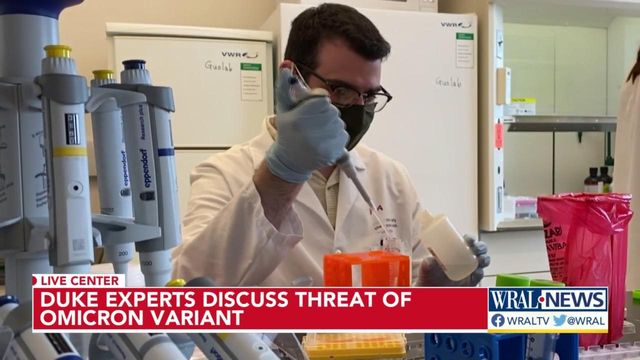People should be more careful during the holidays as omicron variant spreads, Duke experts say
Health experts, scientists and researchers are still learning about the omicron variant of the COVID-19 virus.
Posted — UpdatedLittle is known about how dangerous the omicron variant is and what kind of illness it can cause, but researchers do know that it is spreading more rapidly than other variants.
Dr. David Montefiori, professor and director of the laboratory for AIDS vaccine research and development at Duke University, said he expects more data on the variant to emerge before Christmas time, when people typically gather in clusters indoors as the weather turns colder.
“I think omicron and the possibility that it could become the next wave and dominate the pandemic, we don’t know that yet," Montefiori said. "But the possibility that it might should raise some concern and make people more careful this holiday season.”
Many officials feel wearing masks, social distancing when possible, and being cautious about gathering in groups are appropriate guidelines to follow. The World Health Organization recommends that high-risk people and adults over the age of 60 should avoid travel at this time.
If people do plan to gather in large groups, indoors, the Centers for Disease Control and Prevention recommends that people wear masks, get tested and get a booster shot if they are eligible.
It's unclear at this time if the omicron variant can evade vaccines — the first confirmed case of omicron was in a traveler who was fully vaccinated less than 6 months ago.
Montefoiri said that researchers are looking into serum samples from people who have received all three vaccines to see how well the antibodies they develop are able to fight off the omicron variant.
"That is usually a fairly reliable predictor of how well the vaccines will be expected to work against a variant," he said.
The variant's rise comes as many Americans are getting booster shots months after the vaccine became available to the general public and weeks after children were deemed eligible for vaccines.
Montefiori said he does feel that more cases of the variant will be discovered soon. So far, the variant has been found in New York, Colorado, California and Minnesota.
“There have been small number of cases in the U.S. and I expect that number to increase substantially in the coming days," he said. "We do not have a clear idea of how contagious this variant is. Is it going to be more contagious than delta and out-compete delta? We really don’t know. It’s just too early.”
COVID-19 cases in North Carolina are still rising, and Dr. Cameron Wolfe, infectious disease expert at Duke University, said most of the cases he sees are of the delta variant.
"We are in a delta wave still in the United States. 100% of the cases we’ve seen recently here at Duke have all been delta," he said. "It’s not a new variant causing that peak. When you overlap what’s happening in December – we’ve had a congregant activity which was Thanksgiving. We’ve had the widest and most frequently-used travel weekend."
But as temperatures cool off and more people let their guard down, cases have been increasing over the past week. North Carolina's positivity rate rests at 7%, which health officials say is dangerously high.
North Carolina's 7-day, rolling average has jumped to 2,057 — the highest seen since Oct. 9.
“It’s getting colder and I think we have to be realistic that when that happens, what do we do? We as a community hunker down and spend more time inside, in close-knit areas where we know COVID transmits readily," Wolfe said. "I suspect that has nothing yet to do with variant activity and everything to do with the fact that, frankly, we’ve eased our guard off a little bit.”
Related Topics
• Credits
Copyright 2024 by Capitol Broadcasting Company. All rights reserved. This material may not be published, broadcast, rewritten or redistributed.






